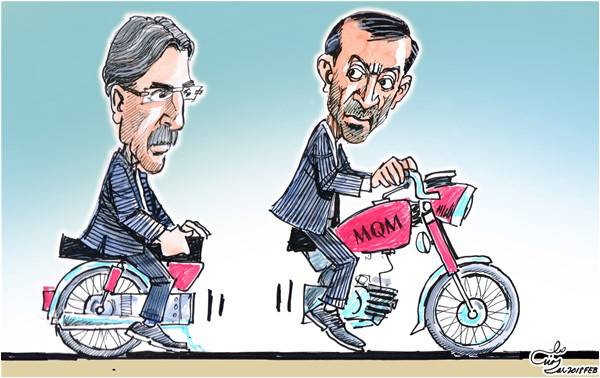
The first is the stunning victory of the PMLN in Lodhran over the PTI’s opening batsman Jehangir Tareen. The second is Imran Khan’s shocking third marriage to a hastily divorced Pirni from Pakpattan with five children. A third is the extraordinary judgment of the Supreme Court disqualifying Nawaz Sharif from being President of the PMLN and nullifying his decisions in that capacity retrospectively.
The Lodhran victory by a nondescript PMLN worker over a scion of the Tareen family has encouraged Nawaz Sharif to flog this victory as a reaffirmation of his “anti-iqama disqualification” narrative plus “development agenda” in the Punjab, even though local sentiment against the Tareens because of “sugar policy politics” may have been no less significant. This victory has emboldened Mr Sharif to become more aggressive in his anti-judiciary campaign, revitalise the spirits of his workers and whip up big crowds across the country. It has also dampened the spirits of the PTI and led to some painful soul searching.
Imran Khan’s third marriage at “election time” has added to the PTI’s woes. It is no less frowned upon than the second one was during his “dharna politics” period. In a deeply conservative society, and one to which Khan panders with his reiteration of “traditional values” etc., it just isn’t done to go off with a “friend’s wife”, mother of five, and his “pirni” to boot. This has added to the disillusionment of his youthful fans who expect higher moral standards from him. And it has confirmed the fears of his older supporters who think that he does not display the gravitas required of a national leader and would-be prime minister.
However, it is the SC’s judgement against Mr Sharif that has the potential to change the political landscape of Pakistan. By also retrospectively nullifying Mr Sharif’s decisions in his capacity as President of the PMLN, it has cast a deep shadow over the fate of the Senate elections due next week because the PMLN candidates were formally approved by Mr Sharif. Either the Election Commission will have to postpone the elections until a new PMLN President is elected and formally approves the candidates or it will have to go ahead without the PMLN candidates and accord victory to the opponents by default. The third option – allowing them to contest as Independents – could save face all round but will not get to the root of the problem. In any case, the PMLN’s “conspiracy theory” that the judiciary is playing unfair politics at the behest of the military will get wind for its sails and reinforce the “victimhood” narrative of Mr Sharif.
Far more significant is the consequential negative impact of this judgment on the credibility and fate of the judiciary. Essentially this judgment has struck a blow against the fundamental constitutional rights of citizens to assemble a political party and its leadership on the unprecedented yardstick of “morality” rather than “integrity or sovereignty of Pakistan or public order”. This flies against the accepted jurisprudence of the land – Articles 62 and 63 apply specifically and only to members of parliament and may not be applied outside parliament to members of political parties – and is so overarching as to restrict many freedoms under the new rubric. It also lends weight to Mr Sharif’s accusation that the law and Constitution are being bent and broken simply to get rid of him personally and forever. Civil society’s discomfort with this decision is accentuated by the aggressive reaction of the judges to criticism of its judgments by threatening contempt proceedings.
The “disqualification” issue is still alive and kicking. Will Mr Sharif be disqualified for life? Former Supreme Court Chief Justice Anwar Jamali had once wondered how people could be disqualified for life on the yardstick of Articles 62 and 63 when the possibility of reforming themselves in due course could not be ruled out. The SC itself has given different judgments on the same issue. For example, Iftikhar Ahmed Cheema, MNA from NA-101, was de-seated in 2015 for concealing assets but allowed to contest a by-election and regain his seat. But Rai Hassan Nawaz was disqualified under Article 62(1)(f) while Jamshaid Dasti was allowed to contest the election and Rizwan Gill, Samina Khawar Hayat and Amir Yar were not allowed to contest under the same constitutional provisions.
We are in Danger Zone. The old notion of “The Establishment” obliquely referred to the civil-military bureaucratic oligarchy. Now, with the judiciary leading the charge, the meaning of the “Miltablishment” is becoming clear to the layman. We should be deeply worried if a perception gains currency that this conflict has become highly personalised, that the judges are fronting for the military, that some of them have a Messiah complex, and Nawaz Sharif is on a populist path that has the potential under these circumstances to plunge state and society into chaos.

